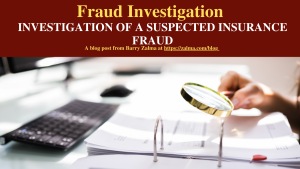Fraud Investigation

See the full video at https://rumble.com/v2pirpw-fraud-investigation.html and at https://youtu.be/jFRp5R6XH3c
The heart of any successful investigation of suspected insurance fraud is the insured’s statement. Its importance cannot be over emphasized, and it should be recorded electronically and then transcribed. The transcribed statement should then be sent to the insured to read, correct and sign.
The primary purpose of the statement is to establish and preserve the insured’s version of all aspects of the loss so that it will be difficult–hopefully, impossible–for the insured to change his version or attempt to explain away the inconsistencies, discrepancies, and misrepresentations that invariably arise as your investigation proceeds.
Insurers are compelled by statute and Regulation to maintain Special Fraud Investigative Units, publish and fulfill a detailed anti-fraud program and train all of their anti-fraud personnel. Compliance by insurers is less than constant across the industry. Some have effective fraud units while others simply identify one employee as their anti-fraud director although his or her work is almost totally adjusting claims and not investigating fraud. The expense of staffing and pursuing the anti-fraud efforts required by statute and regulation reduces the profits earned by the insurer and is believed to be offset by the lack of payment to fraud perpetrators. Of course, these efforts are also made difficult by the imposition of fair claims settlement practices regulations that require quick, complete, thorough investigations and fair treatment and prompt payment of insureds even when fraud is suspected. The two opposing sets of laws create a Catch-22 from which insurers find difficulty complying with both.[1]
Investigation techniques including, but not limited to, interviewing, photography of loss scenes, use of independent experts, use of private investigators and use of claims counsel all are part of the required thorough investigation.
Since exposing fraudulent activity, if it exists at all, is a goal of an insurance claims investigation that really wants to find a proper, honest and viable claim, accuracy is crucial. There must be no confusion about the circumstances of the loss, the items claimed, and the amount claimed–in short, all aspects of the suspected claim. It is more important to the claims person to find that the suspicious claim is, in fact, proper and remove all doubts. It is a successful claims investigation. Finding sufficient evidence of fraud to defeat a claim is important, but not as important as paying promptly a legitimate claim.
Obtaining a complete statement, the first time out is preferred because second and third truthful statements become more and more difficult to get as the investigation matures. The most obvious reason for this difficulty is that the insured becomes wary or suspicious of the repeated inquiries and will be reluctant to cooperate. The professional claims person will want the investigation to be accomplished quickly so that the insured will not realize what’s going on and take steps to cover his tracks.
Accuracy and completeness are also essential as a process of verification necessary to ascertain whether what the insured reports and claims is, in fact, true or false. Of course, verification is accomplished by contacting the various sources of the true information, such as retailers, prior carriers, agents, adjusters, and law enforcement agencies–all of which is covered.
The statement the claims person obtains may be relied on to pay a legitimate loss, to deny the claim because it was not caused by a peril insured against, to deny a claim because of attempted fraud by the insured, used as evidence to rescind the policy and/or defend against a civil suit by the insured, and because the statement itself is the most direct evidence of insurance fraud. The recorded statement may also be used in a criminal prosecution of the insured. The importance of the statement and the requirement that it be meticulously performed and transcribed is important and essential to each claims investigation.
[1] For detail consider Barry Zalma’s book California SIU Regulations 2020 available on amazon.com.
 (c) 2023 Barry Zalma & ClaimSchool, Inc.
(c) 2023 Barry Zalma & ClaimSchool, Inc.
Subscribe and receive videos limited to subscribers of Excellence in Claims Handling at locals.com https://zalmaoninsurance.locals.com/subscribe.
Consider subscribing to my publications at substack at https://barryzalma.substack.com/publish/post/107007808
Go to Newsbreak.com https://www.newsbreak.com/@c/1653419?s=01
Barry Zalma, Esq., CFE, is available at http://www.zalma.com and zalma@zalma.com
Follow me on LinkedIn: www.linkedin.com/comm/mynetwork/discovery-see-all?usecase=PEOPLE_FOLLOWS&followMember=barry-zalma-esq-cfe-a6b5257
Write to Mr. Zalma at zalma@zalma.com; http://www.zalma.com; http://zalma.com/blog; daily articles are published at https://zalma.substack.com. Go to the podcast Zalma On Insurance at https://podcasters.spotify.com/pod/show/barry-zalma/support; Follow Mr. Zalma on Twitter at https://twitter.com/bzalma; Go to Barry Zalma videos at Rumble.com at https://rumble.com/c/c-262921; Go to Barry Zalma on YouTube- https://www.youtube.com/channel/UCysiZklEtxZsSF9DfC0Expg; https://creators.newsbreak.com/home/content/post; Go to the Insurance Claims Library – https://zalma.com/blog/insurance-claims-library.
Like this:
Loading…
Related
About Barry Zalma
An insurance coverage and claims handling author, consultant and expert witness with more than 48 years of practical and court room experience.







